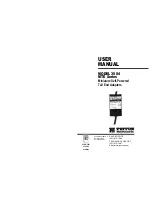
Document Reference No.: ES_000008
S1-A-7001 RS232 to 1-Port CANbus Adapter User Guide
Version 1.2
Clearance No.: ES #03
©2009-10 EasySync Ltd.
15
4.1.6
Set Acceptance Mask (m)
Summary
The Acceptance Mask, in conjunction with the Acceptance Filter (M), defines which received
messages (i.e. of a specific ID or range of CAN IDs) will be passed to the RS232 interface. The
Acceptance Mask value corresponds to bits within a range of valid CAN IDs for either standard or
extended CAN messages.
Set Acceptance Mask (m) command should be executed
prior
to Set Acceptance Filter (M).
NOTE:
The CAN channel will revert to its prior state after execution. For example if the channel
is Open when this command is executed, the channel will update the setting and return to the
Open state.
Definition
miii<CR> for standard 11-bit CAN messages
miiiiiiii<CR> for extended 29-bit CAN messages
Parameters
iii = standard 11-bit CAN mask (0x000 through 0x7FF)
iiiiiiii = extended 29-bit CAN mask (0x00000000 through 0x1FFFFFFF)
A value of “0” in a bit location indicates that the bit location ID value is to be
ignored
when filtering messages.
Default is to pass all frames (Acceptance Mask = 0x000 for standard messages and
0x00000000 for extended messages)
Remarks
Example
m700<CR>
Set Acceptance Mask to check bits 10, 9 and 8 against the filter. Bits 7 thorugh 0 are ignored as
“don’t care”. Use the Acceptance Mask in conjunction with the Acceptance Filter, defined next.
Return Codes
<CR> = OK
<BELL> = ERROR
















































